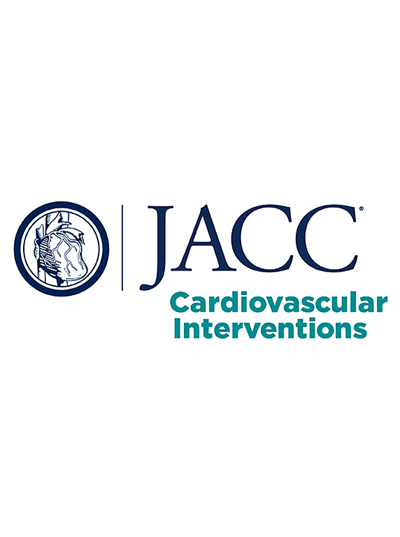Mid-Term Outcomes of K-Clip Transcatheter Tricuspid Annuloplasty System in Patients With Severe Functional Tricuspid Regurgitation
IF 11.7
1区 医学
Q1 CARDIAC & CARDIOVASCULAR SYSTEMS
引用次数: 0
Abstract
Background
Conservative treatments for tricuspid regurgitation (TR) frequently yield suboptimal outcomes. Transcatheter interventions provide a new therapeutic avenue, with ongoing assessments of safety and effectiveness.
Objectives
The TriStar (Confirmatory Clinical Study of Treating Tricuspid Regurgitation With K-Clip™ Transcatheter Annuloplasty System) study investigated 1-year outcomes of the K-Clip transcatheter tricuspid annuloplasty system in treating patients with severe functional TR.
Methods
Patients with TR grade ≥4, resistant to medical management, were enrolled and selected by core laboratory evaluation. Oversight by a data and safety monitoring board and event adjudication by a clinical events committee occurred. Assessments at 30 days, 6 months, and 1 year included echocardiographic data, clinical symptoms, quality of life, study endpoints, and major adverse events.
Results
A total of 96 patients (mean age 72.6 years, 59.4% women) were included, with a 97.9% implantation success rate. One-year outcomes showed 5.2% all-cause mortality, a 19.8% composite major adverse event rate, and no device-related reinterventions. TR decreased by ≥1 grade in 94.2%, and by ≥2 grades in 87.2% of patients. Kaplan-Meier estimates demonstrated 94.7% ± 2.3% survival and 90.4% ± 3.0% freedom from heart failure rehospitalization. NYHA functional class significantly improved (P < 0.001), with 97.7% reaching functional class I or II. The 6-minute walk distance improved by 42.8 m (P < 0.001), and Kansas City Cardiomyopathy Questionnaire score increased by 7.0 points (P < 0.001).
Conclusions
The K-Clip transcatheter tricuspid annuloplasty system showed high procedural success, a favorable safety profile, sustained TR reduction, and marked improvements in clinical outcomes and quality of life at 1 year. (Confirmatory Clinical Study of Treating Tricuspid Regurgitation With K-Clip™ Transcatheter Annuloplasty System [TriStar]; NCT05173233)
K-Clip经导管三尖瓣环成形术治疗严重功能性三尖瓣反流的中期疗效。
背景:三尖瓣反流(TR)的保守治疗经常产生不理想的结果。经导管介入治疗提供了一种新的治疗途径,其安全性和有效性正在进行评估。目的:TriStar (K-Clip™经导管环成形术治疗三尖瓣反流的验证性临床研究)研究调查了K-Clip经导管三尖瓣环成形术治疗严重功能性TR患者1年的结果。方法:通过核心实验室评估入选TR等级≥4,对药物治疗有抵抗力的患者。由数据和安全监测委员会进行监督,由临床事件委员会进行事件裁决。30天、6个月和1年的评估包括超声心动图数据、临床症状、生活质量、研究终点和主要不良事件。结果:共纳入96例患者,平均年龄72.6岁,女性59.4%,植入成功率97.9%。一年的结果显示,全因死亡率为5.2%,综合主要不良事件发生率为19.8%,无器械相关的再干预。94.2%的患者TR降低≥1级,87.2%的患者TR降低≥2级。Kaplan-Meier估计生存率为94.7%±2.3%,心力衰竭再住院率为90.4%±3.0%。NYHA功能分级显著提高(P < 0.001), 97.7%达到功能I或II级。6分钟步行距离提高42.8 m (P < 0.001),堪萨斯城心肌病问卷评分提高7.0分(P < 0.001)。结论:K-Clip经导管三尖瓣环成形术系统具有较高的手术成功率、良好的安全性、持续的TR降低以及1年临床结果和生活质量的显著改善。K-Clip™经导管环成形术治疗三尖瓣返流的临床验证研究[TriStar];NCT05173233)。
本文章由计算机程序翻译,如有差异,请以英文原文为准。
求助全文
约1分钟内获得全文
求助全文
来源期刊

JACC. Cardiovascular interventions
CARDIAC & CARDIOVASCULAR SYSTEMS-
CiteScore
11.60
自引率
8.80%
发文量
756
审稿时长
4-8 weeks
期刊介绍:
JACC: Cardiovascular Interventions is a specialist journal launched by the Journal of the American College of Cardiology (JACC). It covers the entire field of interventional cardiovascular medicine, including cardiac, peripheral, and cerebrovascular interventions. The journal publishes studies that will impact the practice of interventional cardiovascular medicine, including clinical trials, experimental studies, and in-depth discussions by respected experts. To enhance visual understanding, the journal is published both in print and electronically, utilizing the latest technologies.
 求助内容:
求助内容: 应助结果提醒方式:
应助结果提醒方式:


